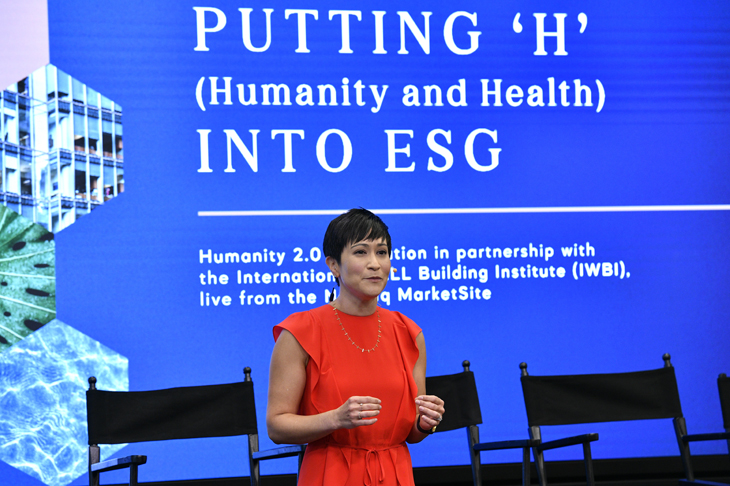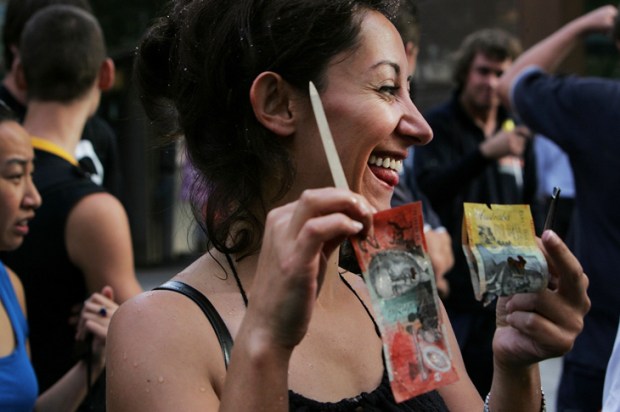Call me an optimistic, but I think we may have reached peak woke in corporate land in Australia. Don’t get me wrong, there will still be plenty of woke/ESG stuff around. Virtue-signalling is very addictive for the senior executives doing the signalling without bearing the costs. ‘Look at me, I’m a good person, even though I earn a hundred times more than the average worker.’
A recent example was Matt Comyn, CEO of Commonwealth Bank, now earning over $10 million. But it’s OK because the bank is making it nigh on impossible to lend to oil and gas companies from 2025. And the donation of $2 million to the Yes campaign is surely an indication of the worthiness of the bank and its chief executive.
Even so, I have a feeling, call it a hunch, that the peak might be behind us. The big companies will still hand over their donations to the Yes campaign – and it sort of makes sense for the mining companies to do so on the instruction of the land councils – but their public, as opposed to their financial, contributions are likely to be relatively muted compared with plans made last year.
The fact that Qantas, on the instruction of that obsequious, toadying outgoing chief, Alan Joyce, has plastered the Yes livery on only three planes out of its entire fleet is telling. Let’s face it, this is a scaled-back effort. That Joyce even admitted that the staff and customers hold a range of views on the Voice is itself staggering. For someone trapped in a woke bubble, this is quite a concession.
It’s worth reviewing the origins of the corporate adherence to wokeness because it informs us about the forces that might cause it to peter out. It goes back a long way and takes on many different slogans. There was the ‘triple bottom line’, ‘corporate social responsibility’, ‘stakeholder capitalism’, ‘B corps’ as well as many other buzzwords I have missed. Environment, social, governance (ESG) is currently the most popular fad.
The core idea is that companies should not simply be concerned with maximising profits to boost the returns to shareholders, who are the owners after all. Companies should have broader, worthier goals, including enhancing the rights of workers, the community, the planet, etc, etc. It is a proposition that has been pushed by the United Nations as well as that promoter of crony capitalism, the World Economic Forum and its head-honcho Klaus Schwab.
There are a number of reasons the ESG corporate craze really took off here and overseas. The low interest rate environment, as well as the steaming ahead of some tech companies, in part meant that many companies that scored highly on the ESG metric were also outperformers on the stock market.
There was also an element of what used to be called the potter’s push – a sufficient number of new investors lifts the price of a stock even if it is not based on any improved financial prospects. As more people piled into ESG-nominated funds, their unit prices rose, at least for a while.
The strong message was that making money and saving the planet are not incompatible; there are no trade-offs. In Australia, this theme particularly resonated with many of the hopelessly unqualified trustees of the industry super funds. A number of grifters entered the field promoting ethical funds management and charging fees of up to 200 basis points above the average. Gosh, if you are buying an indulgence, there has to be a meaningful price.
Trouble at the mill began to emerge as the market turned against tech companies, particularly those not making any money, and the price of fossil-fuel commodities began to soar. The relative performance of ESG funds tanked and those canny investors, such as Warren Buffet who had gone long on oil and gas, profited handsomely. The ESG message was suddenly on the nose.
In the meantime, the woke/ESG crowd had massively infiltrated company hierarchies. In the US, in particular, the appointment of a chief diversity officer became close to mandatory.
The one thing that these new overpaid, puffed-up ESG types didn’t anticipate was the potential for the consumers of the products/services of their companies to revolt against unwelcome woke changes of direction – think here marketing and product range.
The examples of Bud Light and Target in the US are now close to legendary as customers responded with horror to the woke direction of those companies. When did understanding your customers become pushing your customers around to the new way of thinking? But the main point here is that the damage inflicted on these companies has been very substantial; it’s not just been a blip. Both companies have been forced to change direction.
My guess is that the senior managers of Australian companies have watched these developments closely with the aim of avoiding a similar fate. While the promotion of the marriage equality plebiscite was full on, there is likely to be a much lower-key effort when it comes to the Voice. We won’t be seeing Michael Chaney, chairman of Wesfarmers, giving us the benefit of his wise advice to vote Yes in an expensively produced, widely circulated video.
In this context, it was a welcome development that former doyen of company directors, Don Argus, had the courage to speak out recently, reminding company directors of their fiduciary duty to the company.
According to Argus, ‘every Board of Directors owes its primary duty of care to the company itself. No stakeholder (shareholder, employee, customer or any other) is entitled to preferential treatment. I am not suggesting that any company will face financial difficulty with the published donation of $2 million, but if the public statements of support, for any perceived political objective, adversely affects the financial performance of the institution, then I suspect the fiduciary duties of a director will be challenged’.
Don’t get me wrong here: ESG may have peaked in corporate Australia, but there will still be plenty around. After all, there are still those legions of junior executives – OK, highly remunerated minions – with their university degrees from Mickey Mouse institutions, sitting in corporate affairs, human relations and marketing departments. Their jobs are to dream up the latest bloated mission statement and to sponsor the worthiest causes of the day. They must ensure a ‘diverse and inclusive’ workforce and educate the company’s workers and consumers in woke ways.
But it’s clear that there has been a light tap on the brake slowing the descent into full ESG madness.
Got something to add? Join the discussion and comment below.
Get 10 issues for just $10
Subscribe to The Spectator Australia today for the next 10 magazine issues, plus full online access, for just $10.
You might disagree with half of it, but you’ll enjoy reading all of it. Try your first month for free, then just $2 a week for the remainder of your first year.













Comments
Don't miss out
Join the conversation with other Spectator Australia readers. Subscribe to leave a comment.
SUBSCRIBEAlready a subscriber? Log in